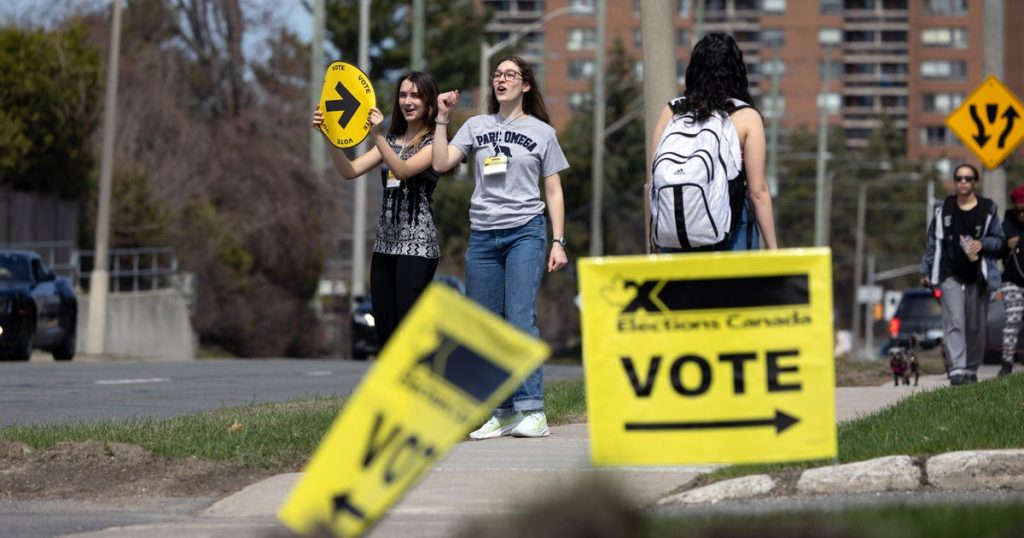Canadians are heading to the polls for an election that could reshape the country’s political landscape. With citizens evaluating key issues such as the economy, immigration, and the growing influence of U.S. President Trump, the stakes have never been higher. Voters have to choose between the incumbent Liberal Party led by Mark Carney and the Conservative Party under the leadership of Pierre Poilievre. The election has gained unprecedented attention due to its potential implications for Canada’s sovereignty and economic stability.
| Article Subheadings |
|---|
| 1) Historical Context of the Election |
| 2) Voter Turnout and Public Sentiment |
| 3) Key Issues Influencing Voter Decisions |
| 4) Impact of U.S. Politics on Canadian Electorate |
| 5) Future Implications of the Election Results |
Historical Context of the Election
The upcoming election holds significant weight in light of historical political shifts in Canada. This is not merely another round of voting but a pivotal moment that could change the dynamics of Canadian governance for a generation. Previously, elections have often revolved around domestic policies and party competence, but this election is notably characterized by external pressures, especially those exerted by President Trump. The discussion surrounding Trump’s proposed tariffs and threats has been framed as a challenge to Canadian sovereignty and economic integrity. This election marks a crucial point where voters must consider whether they wish to maintain the current government’s policies or embrace a shift in political agenda.
Voter Turnout and Public Sentiment
As the election approaches, voter engagement has reached unprecedented levels. Recent statistics from Elections Canada reveal that an estimated 7.3 million Canadians participated in advance voting—a remarkable 25% increase compared to the last elections held in 2021. This surge in voter turnout reflects a heightened public interest and concern regarding the direction in which the country is heading. Many voters express their feelings of urgency and responsibility to be involved in one of the most significant elections in recent history, viewing it as a chance to shape not only their economic future but also their national identity.
Key Issues Influencing Voter Decisions
Several key factors dominate the conversations among voters as they prepare to cast their ballots. The first and most pressing concern is the economy, particularly in relation to affordability. Many citizens voice their frustrations regarding rising costs of living and the need for effective government policies to address these challenges. In addition, immigration continues to be a focal point of debate, with concerns related to its impact on jobs and social services. Crime has also surfaced as a significant issue, as voters seek assurances that their safety is a priority. The common thread among these issues is a desire for stability and confidence in leadership to navigate complex challenges, both domestically and internationally.
Impact of U.S. Politics on Canadian Electorate
The influence of U.S. politics has never felt more palpable in Canada, especially during this election cycle. President Trump has made headlines with controversial statements, including his suggestion that Canada might become the 51st state. These remarks have sparked outrage, with Canadian politicians, including Pierre Poilievre, publicly denouncing such views and affirming Canada’s sovereignty. Belgian observers and analysts suggest that Trump’s comments have heightened awareness among voters about the importance of establishing a strong national identity. Many Canadians are concerned that whoever is elected must assertively stand against overseas pressures and advocate for an independent policy agenda.
Future Implications of the Election Results
The implications of the election outcomes are vast and could have a lasting impact beyond domestic politics. Experts predict that the results could redefine Canada’s relationship with its southern neighbor while also influencing how Canada positions itself in the global arena. Should the Liberal Party remain in power, it may continue its current policies regarding trade and foreign relations, focusing on multilateral partnerships. Conversely, a Conservative win might usher in a shift toward more nationalistic policies, potentially altering Canada’s engagements and responses to international dynamics, particularly those emanating from the U.S. The outcome will, undoubtedly, shape Canada’s approaching decade and establish new precedents for governance.
| No. | Key Points |
|---|---|
| 1 | The election could redefine Canada’s political dynamics for a generation. |
| 2 | Voter turnout for advance voting has surged by 25% compared to 2021. |
| 3 | Key issues include economic stability, immigration, jobs, and crime. |
| 4 | Trump’s influence over the elections has stirred national conversations about sovereignty. |
| 5 | The results could have significant long-term implications for Canada’s international relations. |
Summary
In conclusion, the Canadian election represents a crossroads for the nation, with critical issues at the forefront of voters’ minds. As citizens weigh their options between the Liberal and Conservative parties, the impact of external pressures—especially from the United States—has never been more significant. The outcome will likely reverberate through Canadian society and politics for years to come, making this election a pivotal moment in the country’s history.
Frequently Asked Questions
Question: What are the main issues influencing the current Canadian election?
The primary issues include the economy, immigration, job security, and crime, with voters expressing concerns about affordability and national sovereignty.
Question: How does U.S. politics impact Canadian elections?
U.S. politics, particularly statements from President Trump, have raised awareness among Canadian voters regarding the importance of maintaining sovereignty and have influenced public sentiment about leadership and governance.
Question: What effects might the election outcomes have on Canada’s global standing?
The election results could redefine Canada’s approach to international relations and trade partnerships, potentially shifting its focus towards more nationalistic policies or maintaining its commitment to multilateralism, depending on which party wins.


